NEWSLETTER QUICK ACCESS TO CONTENT
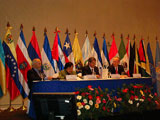 The Bulletin in International Health is a publication developed by the Leaders in International Health Program “Edmunda Granda Ugalde” (LIHP) of the Pan American Health Organization/World Health Organization (PAHO/WHO). The purpose of the Bulletin is to contribute to the dissemination of information on international health issues among Program participants and other relevant actors from academia and practice in the areas of public health and international relations. The Bulletin enables people outside of the Program to learn more about international health issues and opportunities as well as the Program itself. The Bulletin in International Health is a publication developed by the Leaders in International Health Program “Edmunda Granda Ugalde” (LIHP) of the Pan American Health Organization/World Health Organization (PAHO/WHO). The purpose of the Bulletin is to contribute to the dissemination of information on international health issues among Program participants and other relevant actors from academia and practice in the areas of public health and international relations. The Bulletin enables people outside of the Program to learn more about international health issues and opportunities as well as the Program itself.
The current issue focuses on the principal developments of the LIHP in 2010 and 2011, including the achievements related to the 25th anniversary of PAHO’s international health program.
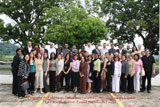 The cohort for the Leaders in International Health Program “Edmunda Granda Ugalde” (LIHP) 2010 was comprised of 51 professionals from 22 countries in the region. While the majority of these professionals hailed from ministries of health and social security institutes, individuals from ministries of finance, academia, international organizations, and non-governmental organizations were also represented. The group also included 16 coordinators of the Cuban Medical Brigades serving in five countries in the Region. The cohort for the Leaders in International Health Program “Edmunda Granda Ugalde” (LIHP) 2010 was comprised of 51 professionals from 22 countries in the region. While the majority of these professionals hailed from ministries of health and social security institutes, individuals from ministries of finance, academia, international organizations, and non-governmental organizations were also represented. The group also included 16 coordinators of the Cuban Medical Brigades serving in five countries in the Region.
Beginning in March 2010, participants engaged in a variety of virtual and onsite learning activities designed to enhance their competencies as international health professionals. In addition to undertaking a series of interactive, problem-based modules, participants worked in country teams to develop country projects related to key national, sub-regional and regional priorities in coordination with the PAHO/WHO Country Office, national authorities and relevant experts. They are currently applying their newly acquired skills and competencies to their home institutions. Information on the participants and their country projects can be found in the following link.
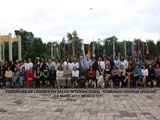 The 2011 cohort Leaders in International Health Program 'Edmundo Granda Ugalde' (LIHP) is comprised of 60 participants from 25 countries (Argentina, Belize, Bolivia, Brazil, Colombia, Costa Rica, Cuba, Chile, Dominica, Ecuador, El Salvador, Grenada, Guatemala, Guyana, Honduras, Jamaica, Mexico, Nicaragua, Panama, Paraguay, Peru, St. Kitts and Nevis, Trinidad and Tobago, Uruguay and US-Mexico Border Office). The 2011 cohort Leaders in International Health Program 'Edmundo Granda Ugalde' (LIHP) is comprised of 60 participants from 25 countries (Argentina, Belize, Bolivia, Brazil, Colombia, Costa Rica, Cuba, Chile, Dominica, Ecuador, El Salvador, Grenada, Guatemala, Guyana, Honduras, Jamaica, Mexico, Nicaragua, Panama, Paraguay, Peru, St. Kitts and Nevis, Trinidad and Tobago, Uruguay and US-Mexico Border Office).
Similar to previous years, the majority of the participants are from ministries of health; nonetheless, there is also a substantial number from academia and international organizations, including PAHO, as well as participants of the Cuban Medical Brigades.
As part of this year’s activities, the 2011 cohort met for a week-long onsite meeting from 2-6 May, 2011 at the Centro Interamericano de Estudios de Seguridad Social (CIESS) in Mexico City, Mexico. This meeting represented the second module of the nine-month LIHP which is primarily conducted virtually. In attendance were 50 participants from 27 Latin American and Caribbean countries as well as the LIHP mentors and coordinators for the learning modules, the LIHP coordination, and PAHO/WHO staff from Washington, DC and Mexico.
The week was kicked off with a panel discussion on some of the key distinctions between international health and global health, followed by a presentation and discussion on the conceptual model of international health proposed by the LIHP. Participants had the opportunity during the meeting to further hone their country projects with the assistance of their assigned mentors. They applied the conceptual model of international health to their specific country projects and presented their ideas to the larger group for feedback and collaboration. A diversity of priority topics in the region are being explored by participants this year, including violence, border health, chronic diseases, access to medicines, the effectiveness of cooperation and others. The meeting also included a workshop on negotiation to reinforce participants’ competencies in this area.
A similar activity was held for the participants who are coordinators of the Cuban Medical Brigades in Havana, Cuba in July.
The LIHP participants are now in the final stages of the Program, having completed the virtual modules and finalizing their country projects which will be presented in December. We will report on the projects in the next issue of the Bulletin.
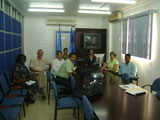 The decentralized nature of the LIHP requires a very close collaboration with the PAHO/WHO Country Offices in order to achieve the effective implementation of the Program. The country offices collaborate on the identification of key institutions and individuals who could benefit from participation in the LIHP, based on national priorities and technical cooperation needs. In addition to promoting and disseminating information about the Program, country offices participate in the evaluation of the candidates, leading the pre-selection process at the country level together with the ministry of health and other relevant entities. Wherever possible, priority is given to inter-disciplinary and inter-sectoral country teams to better contribute to the collective learning of the group and strengthening of the country project. Some country offices have incorporated their own technical staff as LIHP participants which has resulted in benefits not only for those individuals but has also contributed to the exercise of technical cooperation in the office. The decentralized nature of the LIHP requires a very close collaboration with the PAHO/WHO Country Offices in order to achieve the effective implementation of the Program. The country offices collaborate on the identification of key institutions and individuals who could benefit from participation in the LIHP, based on national priorities and technical cooperation needs. In addition to promoting and disseminating information about the Program, country offices participate in the evaluation of the candidates, leading the pre-selection process at the country level together with the ministry of health and other relevant entities. Wherever possible, priority is given to inter-disciplinary and inter-sectoral country teams to better contribute to the collective learning of the group and strengthening of the country project. Some country offices have incorporated their own technical staff as LIHP participants which has resulted in benefits not only for those individuals but has also contributed to the exercise of technical cooperation in the office.
At the start of each LIHP cohort, country offices orient the participants in the definition of the priority topics facing the country, sub-region or region that could potentially form the basis for their country project. They facilitate the development of the country project through its various stages, including the design, provision of documents and other key resources for analysis, facilitating relationships with relevant entities and actors, technical assistance, and implementation. In some instances where the project forms part of the country office’s own technical cooperation, they have also collaborated with the identification of funding sources. Offices also participate actively in the development of the Interactive International Health Rooms (IIHR), providing technical cooperation where feasible, and facilitate relationships with the Community of Practice related to the project.
The country offices also continuously support the overall learning process of the participants, helping them to apply the acquired knowledge and competencies to the national context. They maintain close ties with the participants, identifying new learning and collaborative opportunities and exposing them to the technical as well as the political and diplomatic dimensions of technical cooperation, something which is of utmost importance in their development as international health professionals.
The collaboration of the country offices is fundamental in ensuring the quality and relevance of the country projects as well as the pertinence and application of the knowledge and skills gained through the Program to the participants’ institutional, national and regional context, thereby enhancing efforts to strengthen national capacity.
Given the importance of sensitizing PAHO/WHO Country Representatives and focal points in the proposed objectives and focus of the LIHP, the Program designed and implemented in 2010 an interactive training module targeted specifically for this audience. The module, which encompasses an estimated 6 hours over the course of two weeks, emphasizes the theoretical bases, and conceptual and methodological proposal of the Program for analyzing public health topics from an international health perspective, as well as the unique role of the country offices in the development of the LIHP.
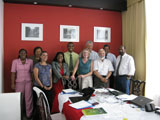 In recognition of the increasing impact of trade on the health of populations, the LIHP introduced in 2010 a new virtual learning module on 'Chronic Diseases and Trade'. The objective of the module is to strengthen the critical and analytical abilities of the participants regarding the main pathways through which trade affects food, alcohol and tobacco consumption, with an emphasis on chronic disease, and to enhance their capacity to formulate and advocate for policies and trade agreements that protect and promote public health and facilitate a reduction in the overall risk of chronic disease as well as in the inequitable distribution of that risk. In recognition of the increasing impact of trade on the health of populations, the LIHP introduced in 2010 a new virtual learning module on 'Chronic Diseases and Trade'. The objective of the module is to strengthen the critical and analytical abilities of the participants regarding the main pathways through which trade affects food, alcohol and tobacco consumption, with an emphasis on chronic disease, and to enhance their capacity to formulate and advocate for policies and trade agreements that protect and promote public health and facilitate a reduction in the overall risk of chronic disease as well as in the inequitable distribution of that risk.
Through the use of case studies, interactive forums, targeted readings and discussion, participants explore the ways in which trade liberalization and trade treaties increase the risks of chronic disease, with particular emphasis on those treaties and agreements subscribed to by their country, sub-region and/or region. Participants examine these treaties and agreements, and evaluate the policy space and policy capacity to regulate for reductions in chronic disease. In addition, they analyze the political and power relational issues related to trade negotiations and explore how health arguments can be better positioned within trade negotiations. As part of the learning activities for the module, the participants engage in a debate on “Alcohol and trade agreements”, in which they are required to present arguments in favor of or against the liberalization of trade in alcohol.
The 5-week virtual module was developed by the Nutritional Institute of Central America and Panama (INCAP) and the Caribbean Food and Nutrition Institute (CFNI) in collaboration with PAHO's Project for the Prevention and Control of Non-Communicable Diseases and the Institute of Population Health, University of Ottawa. The module was developed in stages. A preliminary workshop took place in Jamaica in October 2009 and included the basic outline and design for the module. A second workshop was held in Washington, DC in May 2010 and focused on the development of the final study guide and learning activities. In addition to the institutions noted above, various individuals and entities collaborated throughout the process, including PAHO’s regional technical advisors in nutrition, alcohol and tobacco, and representatives from the Ministry of Health and Environment, Ministry of Industry, Investment and Commerce, and Ministry of Agriculture of Jamaica. Worth noting also has been the incorporation of two previous graduates of PAHO’s international health program as tutors for the 2010 and 2011 cohorts.
In addition to the LIHP participants, members of the Technical Commission on Chronic Diseases (CTCC) of Central America and the Dominican Republic have also benefitted from the module, including a total of 13 CTCC members in 2010 and 2011 from Belize, Costa Rica, Dominican Republic, El Salvador, Guatemala, Honduras and Panama. The readings, presentations and learning activities of this and all of the LIHP modules are available for use by interested individuals and institutions through the virtual classroom of PAHO’s Virtual Campus for Public Health (VCPH).
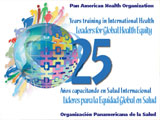 In 1985, PAHO noted the need to develop a new type of leadership in the Region that would permit a better understanding of international cooperation in health and of the role of the Organization, and that would promote solidarity among countries and a strong commitment to social justice and the right to health. This vision resulted in the creation of the Training Program in International Health (TPIH), also known as the ‘residency program’, an innovative training initiative based at PAHO/WHO headquarters in Washington, DC and which, over the course of its 21 years of existence, contributed to the development of 182 professionals from 32 countries. In 1985, PAHO noted the need to develop a new type of leadership in the Region that would permit a better understanding of international cooperation in health and of the role of the Organization, and that would promote solidarity among countries and a strong commitment to social justice and the right to health. This vision resulted in the creation of the Training Program in International Health (TPIH), also known as the ‘residency program’, an innovative training initiative based at PAHO/WHO headquarters in Washington, DC and which, over the course of its 21 years of existence, contributed to the development of 182 professionals from 32 countries.
Based on this positive experience, and with a desire to enable more health professionals to benefit from training in international health, PAHO launched in 2008 a new, decentralized version of the Program, entitled Leaders in International Health Program. In 2009, the Program adopted the name of Dr. Edmundo Granda Ugalde, an academician, respected leader and champion for equity in health in his native country of Ecuador and throughout the region. In the four years since its inception, 185 participants from 31 countries have participated in the LIHP, which is based in the Virtual Campus for Public Health.
The year 2010 marked the 25th anniversary of PAHO’s international health program, which – through its two modalities – has contributed to the development of more than 360 professionals from 35 countries in the Region. In commemoration of this important milestone, PAHO hosted an International Health Conference from 1-3 December, 2010 in San Salvador, El Salvador. This celebration included many of the founders of the original program, among them, the current Minister of Health and first Program Coordinator, Dr. María Isabel Rodriguez, and Dr. José R. Teruel, Adjunct Professor at Georgetown University. They were accompanied virtually by Dr. Mirta Roses Periago and Dr. Carlyle Guerra de Macedo, Director and Director Emeritus, respectively, of the Pan American Sanitary Bureau, as well as Dr. José R. Ferreira, Chief, International Cooperation at the Fundação Oswaldo Cruz (FIOCRUZ).
The event included two principal moments: (1) commemoration of the 25th anniversary; and (2) activities specific to the LIHP 2010. The former was comprised of presentations and panel discussions by Program founders, former and current participants, mentors and tutors, and allowed those present to critically reflect upon the progress and limitations of international health from 1985 to date. The LIHP-specific activities included discussions and contributions to the conceptual model of international health, a workshop on leadership, and consolidation of the academic and graduate networks.
In addition to the approximately 80 persons physically present at the conference – including participants from the LIHP 2010, ex-residents from El Salvador and other countries, professionals from the Ministry of Health and the PAHO/WHO Country Office in El Salvador, university students and other invited guests – there were also more than 100 virtual participants from over 25 countries connected through the Webcast and Elluminate rooms.
The PowerPoint presentations and recordings from the event can be found on the 25th Anniversary Website. In addition, a series of short interviews were conducted with meeting participants during which they discussed their views on the principal international health issues today. These materials can be downloaded and used for didactic purposes if desired.
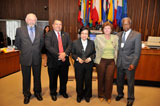 A follow-up event to the anniversary took place in September, 2011 during the 51st Directing Council of PAHO. Presided by Dr. Mirta Roses, the event included a short video celebrating the achievements of the international health program over 25 years as well as speeches by Dr. Roses and Dr. María Isabel Rodriguez. A follow-up event to the anniversary took place in September, 2011 during the 51st Directing Council of PAHO. Presided by Dr. Mirta Roses, the event included a short video celebrating the achievements of the international health program over 25 years as well as speeches by Dr. Roses and Dr. María Isabel Rodriguez.
A commemorative plaque was presented to Dr. Rodriguez in recognition of her contributions to the field of international health, followed by a small reception.
LIHP participates in Global Health Education Consortium 2010
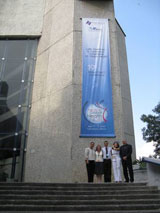 The Global Health Education Consortium (GHEC) was founded in 1991 to promote global health education in schools dedicated to the health professions and medical residency programs. The consortium is composed of more than 1000 educators, researchers, health professionals and students representing over 90 institutions in the United States, Canada, Latin America and the Caribbean. Comprised primarily of doctors in the first years, its membership has expanded to include other fields such as nursing, public health and other health professions. The Global Health Education Consortium (GHEC) was founded in 1991 to promote global health education in schools dedicated to the health professions and medical residency programs. The consortium is composed of more than 1000 educators, researchers, health professionals and students representing over 90 institutions in the United States, Canada, Latin America and the Caribbean. Comprised primarily of doctors in the first years, its membership has expanded to include other fields such as nursing, public health and other health professions.
On the occasion of its 19th annual meeting, GHEC and the National Institute of Public Health [Instituto Nacional de Salud Pública (INSP)] of Mexico decided to unify their efforts, resulting in the celebration of the 19th Annual Meeting of the Global Health Education Consortium and the First Congress of Latin American and Caribbean Forum on Global Health held from 9-11 April, 2010 on the INSP campus in Cuernavaca, Mexico. The main topics covered were: global health education, lessons learned from influenza A (H1N1), institutional alliances, ethics and equity, social determinants, health diplomacy, education and development of human resources for health, clinical practice and STDs/AIDS education. PAHO / WHO served as a co-sponsor of the meeting. The LIHP Coordination and some participants attended the meeting, presenting the results of their country projects in a variety of topic areas, including border health, chronic diseases and trade, violence in Central America, migration of human resources and regulation of medicines. The webcasts of the various presentations are available at:
http://globalhealth.kff.org/Home/KGH/Series/GHEC%202010.aspx
International Health Seminars
The objective of the international health seminars is to delve more deeply and reflect upon current international health topics in order to contribute to their analysis as well as to decision-making and public policy formulation in health. Since 2008, the LIHP coordination has included cross-cutting seminars as a way to demonstrate the application of the forces of the international health conceptual model and the inter-relationships between the same. As such, the Program has promoted spaces for discussion and analysis, using topics related to the learning modules as case studies. This has allowed participants from the different cohorts to better visualize the integral nature of the LIHP and strengthen their competencies through various learning strategies.
The following International Health Seminars were held in 2010 and 2011
- Conflicts and cooperation in disaster situations:
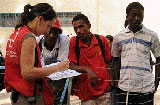 The objective of this seminar was to explore the tensions that can arise within and between countries as well as between cooperation agencies during disaster situations. This topic is of great importance to the LIHP in view of the disasters occurring in early 2010 in both Chile and Haiti. In addition, the LIHP participants from Chile chose as their country topic an analysis of the international cooperation actions of various entities in that country in the wake of the 2010 earthquake. The seminar also demonstrated the interaction and juxtaposition between two main forces of the international health conceptual model: conflicts and cooperation. In this way, the seminar contributed to a better understanding of some of the elements in the process. The objective of this seminar was to explore the tensions that can arise within and between countries as well as between cooperation agencies during disaster situations. This topic is of great importance to the LIHP in view of the disasters occurring in early 2010 in both Chile and Haiti. In addition, the LIHP participants from Chile chose as their country topic an analysis of the international cooperation actions of various entities in that country in the wake of the 2010 earthquake. The seminar also demonstrated the interaction and juxtaposition between two main forces of the international health conceptual model: conflicts and cooperation. In this way, the seminar contributed to a better understanding of some of the elements in the process.
The seminar included the participation of the Ministry of Health of Chile, who presented their experience and the lessons learned. In addition, Rear Admiral (RADM) Craig Vanderwagen, Assistant Secretary for Preparedness and Response (ASPR), U.S. Department of Health and Human Services (retired) shared principal aspects and points for the evaluation of the international cooperation process arising from Hurricane Katrina in 2005. Finally, Dr. Ciro Ugarte, Advisor on Disaster Preparedness for PAHO’s Area of Emergency Preparedness and Disaster Relief, spoke on two topics: How to ask and how to donate? and Lessons learned regarding aid and cooperation in disaster situations, during which he emphasized practical recommendations for donations to countries in emergency situations. Although a representative from Haiti was also invited to participate in the seminar, this was not possible due to the current situation in the country. The recording and other materials from the seminar can be found on the regional Interactive International Health Room (IIHR). An article arising from the research of the Chilean participants has been recently published in a special issue on international health of the Pan American Journal of Public Health.
- The Impact of Climate Change on Food Security:
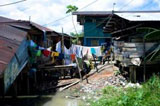 The objective of this seminar, which took place in 2010, was to provide the LIHP participants with elements for a better understanding of the effect of climate change on the health of populations, beyond those caused by the environment. The seminar also served as a ‘bridge’ between two of the LIHP educational modules, namely, ‘Climate Change, Development and Health’ and ‘Nutrition, Human Capital and Development’. Panelists included Dr. Carlos Corvalan, Senior Advisor in Risk Assessment and Global Environmental Change for PAHO’s Area of Sustainable Development and Environmental Health (SDE), who gave a presentation on the impacts generated by climate change on food and nutritional security. Other participants included Mr. Gerardo Sánchez of the WHO Centre for Human Development in Kobe, Japan who focused his presentation on mitigation and adaptation to climate change, and Dr. Manuel Peña, Coordinator of The Pan American Alliance for Nutrition and Development who presented that entity’s viewpoint on the topic. The presentations can be found in the Interactive International Health Rooms (IIHR). The objective of this seminar, which took place in 2010, was to provide the LIHP participants with elements for a better understanding of the effect of climate change on the health of populations, beyond those caused by the environment. The seminar also served as a ‘bridge’ between two of the LIHP educational modules, namely, ‘Climate Change, Development and Health’ and ‘Nutrition, Human Capital and Development’. Panelists included Dr. Carlos Corvalan, Senior Advisor in Risk Assessment and Global Environmental Change for PAHO’s Area of Sustainable Development and Environmental Health (SDE), who gave a presentation on the impacts generated by climate change on food and nutritional security. Other participants included Mr. Gerardo Sánchez of the WHO Centre for Human Development in Kobe, Japan who focused his presentation on mitigation and adaptation to climate change, and Dr. Manuel Peña, Coordinator of The Pan American Alliance for Nutrition and Development who presented that entity’s viewpoint on the topic. The presentations can be found in the Interactive International Health Rooms (IIHR).
A seminar was held on a related topic in 2011 in which a case study was presented regarding the development of local capacity in a community in Bolivia to help ameliorate the effects of climate change on agricultural production. Following presentation of the case study, two panelists were invited to comment from the perspective of nutritional and food security and climate change, respectively. The panelists included Dr. Carlos Corvalan from PAHO and Mr. Germán González from INCAP. Mr. González presented the effect of climate change on food and nutrition security; addressing topics as vulnerability, adaptation, resilience and changes in the food patterns and the maintenance of food quality.
Dr. Fernanda Wanderley, from the Universidad Católica Boliviana “San Pablo” in Bolivia, gave a presentation on “The challenges of development at the beginning of the 21st Century”. The objective of the presentation was to provide participants with different perspectives on models of development, contributing to their understanding of the topic and enhancing their ability to consider it when developing their own international health country topics. The 2011 presentation was intended as an introduction to two LIHP modules that focus on models of development as a force of the international health conceptual model: Nutrition, Human Capital and Development; and Climate Change, Development and Health.
Dr. Ronald Labonté, Canada Research Chair for Globalization/Health Equity and Professor, Faculty of Medicine, Institute of Population Health, University of Ottawa, Canada, gave a presentation on trade and health. This activity not only contributed towards the development of trade as a force in the LIHP international health conceptual model but also served as a preamble to the subsequent learning modules that focus the impact of trade on different health topics: Chronic Diseases and Trade and Access to Medicines, Trade and International Agreements.
As an integral part of Module 3 on International Cooperation and Health Diplomacy, the LIHP organized two panel discussions on border health. The first panel discussed the particular situations faced by two border regions: Mexico-United States, and Guyana which shares borders with Brazil, Venezuela and Suriname. The second session addressed aspects related to progress made between bordering States and the lessons learned in the process. The case studies used for the second panel were the Andean region and Mercosur.
Panelists included:
- María Teresa Cerqueira. Chief, US-Mexico Border Office, Pan American Health Organization, El Paso, Texas
- Dan Reyna † 19.07.11, General Manager, U.S. Section, Office of Global Health Affairs, Office of the Secretary, U.S. Department of Health and Human Services, US-Mexico Border Health Commission, El Paso, Texas
- Edward Greene, Advisor to CARICOM/CARPHA for the Caribbean Public Health Agency
- Carlos Arosquipa, Advisor, Office of External Relations, Mobilization of Resources and Partnerships, Lima, Peru
- Luis Beingolea, Andean Organization for Health, Lima, Peru
One of the products of the panel was the opening of a discussion forum regarding the conceptualization of border health and cooperation across borders. In this way, the LIHP was able to respond to the need expressed by previous cohorts to better position the topic and open it up for analysis and intervention.
The Leaders in International Health Program “Edmundo Granda Ugalde" is pleased to announce the following publications devoted to international health issues which have arisen as a direct result of the LIHP.
Revista Cubana de Salud Pública Internacional

The Revista Cubana de Salud Pública Internacional (in English, The Cuban Journal of International Public Health) was published in December, 2010. This first journal edition includes articles stemming from the country projects of the participants of the Cuban Medical Brigades in 2009. Future editions of the journal will include projects from subsequent cohorts.
Special issue on international health of Pan American Journal of Public Health

A special issue on international health of the Pan American Journal of Public Health was published in September, 2011. This issue, which represents the first such journal produced by the Program, includes articles by participants from the LIHP 2009 and 2010 cohorts, ex-residents from the former modality of the Program, and other collaborating partners.
Infor:mation and applications for the Leaders in International Health Program “Edmundo Granda Ugalde” 2012 will be available shortly at
http://new.paho.org/hq/index.php?option=com_content&task=view&id=2633&Itemid=3499
Interested individuals can also request information by contacting INTLHLTH@paho.org
|

